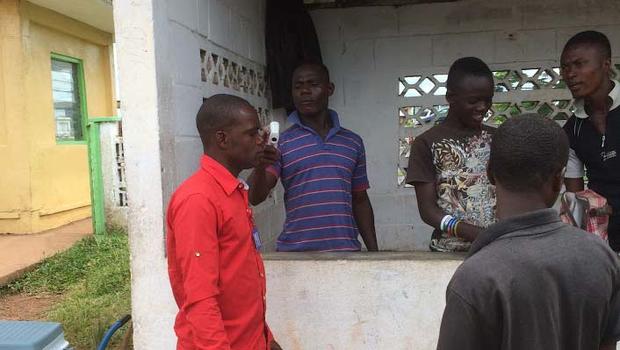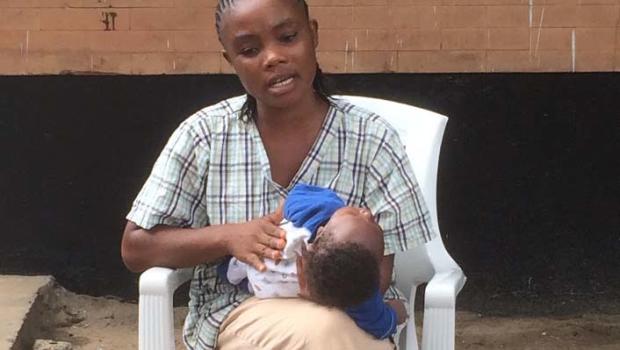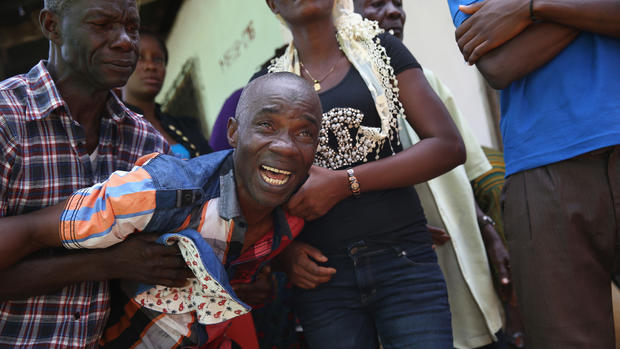Ebola in Liberia: Reporter recounts pockets of hope amid "corridors of misery"
After weeks of preparation and a fair amount of anxiety, finally I was here.
I arrived in Liberia's capital of Monrovia in the early hours of the morning after four plane trips across two days. There are only two airlines still flying into Liberia - a reminder of another devastating effect of Ebola as West Africa remains all but cut off from the rest of the world.
The minute you land in Monrovia, the compulsory hand-washing in chlorinated water and mandatory temperature checks begin. It starts at the entrance to the arrivals area at the airport and from then on before you enter any public place. It becomes a comforting ritual - reeking of chlorine - the smell of safety and survival. And even after we return home, we will continue to take our temperatures twice daily for a period of 21 days just to make sure we are healthy. The disease has a 2-21 day incubation period and you can only transmit if you have actual symptoms of Ebola - but still there is uneasiness. My work has always carried an element of risk but for the first time I could potentially take that risk back home to my children.
But like most things in life, the fear of going to cover the Ebola outbreak in Liberia was worse than actually being there and reporting on it. However, it is certainly an assignment like no other - you can never let your guard down, not for one second. Ebola is an unforgiving virus. You don't know where it is hiding and it preys on weakness - a lapse of concentration during which you touch your face, exhaustion where you momentarily rub your eyes or a natural act of warmth when you absentmindedly reach out to shake someone's hand.
And while it is actually very difficult to contract Ebola - it has to be transmitted through direct body-to-body fluids - there is still a need to be hyper-vigilant. Our team would decontaminate ourselves and our equipment after going into any high-risk area. Crowded slums are a perfect incubator for this virus but posed additional risks because of the concern that people could press against us. Our cameraman Abdi Cadani had the toughest job - he had to film using a monopod instead of a tripod and could never rest it on the ground in high-risk zones. The heat was already debilitating but then add even the minimal protection - goggles, gloves, wellingtons - and it is almost impossible to work. And even in these terrible conditions, he still managed to film this story beautifully and compassionately.
I was already gasping for air during a 20-minute practice session in our hazmat suits - and that was in an air-conditioned hotel room. Imagine being a nurse working for hours on end with patients in double layers of protective gear. I have a newfound respect for the health workers battling this virus.
Liberia survived years of civil war only to come out on the other side and face this. Its health system was already dysfunctional - and now the Ebola virus has devastated what little was left of it. A quick walk around the capital city makes it clear that there is no infrastructure here. As one government official told me: "The power supply to Liberia is the equivalent to the power supply to one gigantic stadium." And all this will be weakened further. Schools and universities are closed by order of the government; this means that there could be no education in Liberia for up to a year.
Crowded slums like Westpoint are the perfect incubators for the spread of this disease - people living on top of each other, packed like sardines. It is actually incredible that there are not more infections in places like this.
That is partly due to organizations like Doctors Without Borders who are doing incredible work. They have turned 50-bed treatment units into 250-bed centers. They run efficient, highly sanitized units and the health workers are tireless. But sadly they have been sounding the alarm on the fact that this outbreak is overwhelming the region for eight months now; it appears to have fallen on deaf ears. Aid and international support continues to trickle in. The United States is running an impressive mission in Liberia that has set up mobile labs and will build more treatment centers. But this is still nowhere near enough - it's like an eye drop in an ocean.
The disease is aggressive and rampant and thrives on poverty and ignorance.
We attended a burial of an Ebola victim in a rural part of Liberia. Despite the fact that the man's sister and mother had recently died of Ebola, the family told us "he just dropped dead... there was nothing wrong with him" and were emphatic that he did not have Ebola. Denial is everywhere - perhaps because the way this disease plays out is almost too unbearable to contemplate. There is no good death with Ebola.
Watching this burial I was struck by how dehumanizing this disease is. People are not just dying of Ebola. American charity worker Katie Meyler told us "they are dying of hopelessness, of loneliness, of despair." You are isolated, denied human contact. It felt so utterly lacking compassion to have to shout our questions to the grieving family - but essential for the safety of everyone that we kept our distance.
And then even in death, there is little dignity. You are a statistic - a faceless person wrapped in a sanitized body bag, carried by men and women covered in double layers of protective gear. At this particular burial, the sister of the man who died sat outside a mud hut - kneeling with her hands outstretched and wailing - she cried about the cruelty and unfairness of this death. And she wept over the fact that she couldn't even get a last look at her brother to say goodbye.
Part of the problem in containing this disease is that the bodies of Ebola victims are at their most contagious after death. In this village the body had clearly been prepared before the burial team arrived but nobody would admit to doing it.
Liberia has a culture of touching the dead, bathing them, dressing them in finery as they prepare for burial. In Monrovia, the government has ordered that all bodies be cremated but this is not sitting well with its residents. It is likely, an official told us, that they will return to contained, sanitized burials in the capital as well.
Amid the corridors of misery and suffering, there are pockets of hopes. Meyler, the American charity worker, was running a school but has now turned it into an outreach center. The charity bought its own ambulance so that it could assist the government in getting people with symptoms of Ebola to treatment centers more quickly. This is crucial to helping prevent the spread of the disease. She also came up with a movingly compassionate idea to buy mobile phones to hand out to Ebola sufferers - at least they can still have a loving voice at the end of the line and won't feel quite so isolated. There are efforts like Meyler's all around the city.
And then there are the ordinary Liberians - brave men and women who risk their lives on a daily basis. Diana Sarteh is head nurse at JFK's 35-bed Ebola unit. She has three children -- her youngest, Anniesithu is only 4 years old. She leaves them every day to work with highly contagious patients. Nurses have the toughest jobs having to put intravenous drips in, take blood and clean up vomit and feces. Even though it is dangerous, she does it because she "took an oath to save lives," she tells us. But every day when she suits up in life-saving protective gear, she thinks of her children and reminds herself to dress slowly and carefully. She cannot lose her concentration for even a second - as that could be deadly.
The stories are everywhere - a mother who refused to let her child die alone and deliberately risked infection to hold her; a daughter who nursed her dying father because she could not imagine this man who had done so much for her being denied loving warmth; a young student who works as part of a burial team - probably the most dangerous job in the world - so that she can pay her school fees. There are also glimmers of light like the young woman I met who survived Ebola and like so many others is caring for the growing number of Ebola orphans as survivors become immune to the disease. These survivors are able to give something back and provide a loving human touch. The terrible thing about this disease is that it thrives on the most basic of human emotions - the need to pick up and care for someone that is hurt. These children need that care and the survivors can now provide it.
As correspondents we are used to covering war zones, which carry their own unique risks, but this battle zone was an assignment like no other.
Here the killer is silent and invisible. You don't know when it could attack. In war, the danger recedes when you retreat from the area. With Ebola, the danger could still be carried inside you.


